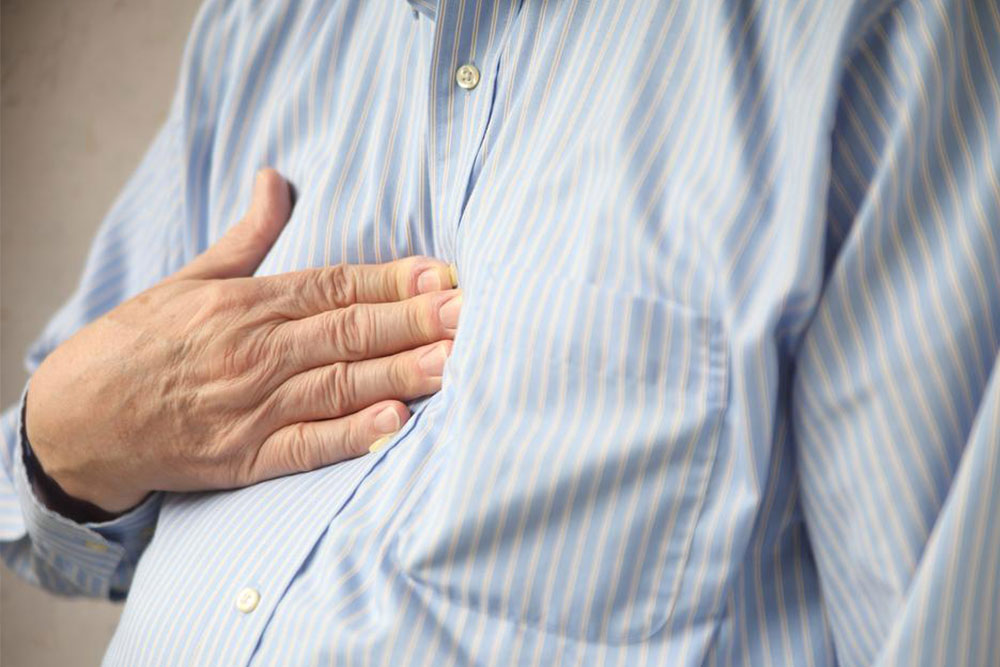Heartburn – Symptoms, Diagnosis, and Treatment Options
Heartburn is a condition that results from a disturbed digestive system. In this condition, the acidic contents of your stomach end up going back up through the esophagus pipe as a result of reflux. This leads to an uncomfortable feeling that is characterized by a burning sensation in the chest, which is commonly known as heartburn.
Heartburn – Main causes, signs, and symptoms
The lower part of the esophagus, or the food pipe, opens up to release food into your stomach. The lower esophageal sphincter, which is the lower part of the food pipe may sometimes end up opening abnormally to release acidic contents back into the esophagus.

As mentioned above, the occurrence of heartburn signs and symptoms can be attributed to the intake of certain kinds of drinks and foods. The intake of spicy foods, in particular, can lead to the onset of heartburn symptoms.
Typical heartburn symptoms and signs
There are certain heartburn symptoms and signs that are characterized by a burning sensation and pain in the chest usually when you lie down or after eating. This sharp pain, accompanied by a burning sensation is usually experienced just below the breastbone or the ribs. You may also experience a strange burning in the back of your throat. A very characteristic heartburn symptom is the taste of a sour, acidic liquid in the back of your throat. These symptoms of heartburn are also accompanied by a sore throat and cough. In very rare cases, there may be problems of a cold sweat or even the feeling of shortness of breath.
Diagnosis of heartburn symptoms and signs
Diagnosis of heartburn may include X-rays and endoscopy. X-rays are taken to examine the condition of your esophagus and your stomach. Endoscopy is conducted to examine your esophagus and check for abnormalities if any. Ambulatory acid probe tests may also be conducted to examine the activity of your stomach acid in your esophagus. Another test, which is the esophageal motility test may be conducted to determine the pressure and movement in the esophagus.
Treatment and management of heartburn symptoms and signs
Treatment of heartburn signs and symptoms essentially involves over-the-counter medications that help in relieving the pain and discomfort associated with heartburn. Antacids may be taken to balance out the stomach acids but these will not be helpful in the healing of your esophagus.
H2 receptor antagonists can also be helpful in providing relief from heartburn-related discomfort and problems. In fact, these medications are known to provide relief for a longer period than antacids. Omeprazole and lansoprazole are proton pump inhibitors and are used to help relieve heartburn signs and symptoms. In case these medications do not work, you may need to visit your doctor to get prescription medications or if need be, they may ask you to get further diagnostic tests done.
Apart from that, you can also deal with the symptoms of heartburn by inculcating certain lifestyle changes. Most importantly, keep a watch on your weight to avoid the problem of your abdomen exerting pressure on your esophagus. This may also lead to the condition of heartburn. Wearing tight fitted clothes must also be avoided to keep this problem at bay. Foods that work as triggers for heartburn should be also be avoided. These include chocolates, peppermint, tomato sauce, and even caffeinated drinks. You must also refrain yourself from the consumption of alcohol if you want to keep the problem of heartburn at bay. You should make sure not to consume large meals to avoid developing heartburn.
Taking meals at inappropriate timings or having meals late is going to increase the chances of you developing this condition. You should avoid smoking because it weakens your lower esophageal sphincter. Moreover, you should also avoid lying down immediately after meals as it could also lead to the development of this condition. You should elevate the head of your bed. This is a helpful technique in dealing with heartburn, especially if you experience heartburn episodes at night before sleeping. A major mistake you should avoid is to start working out immediately after meals. Since food takes time to digest, it is suggested that you wait at least 2 hours before performing physical exercises of any kind.

